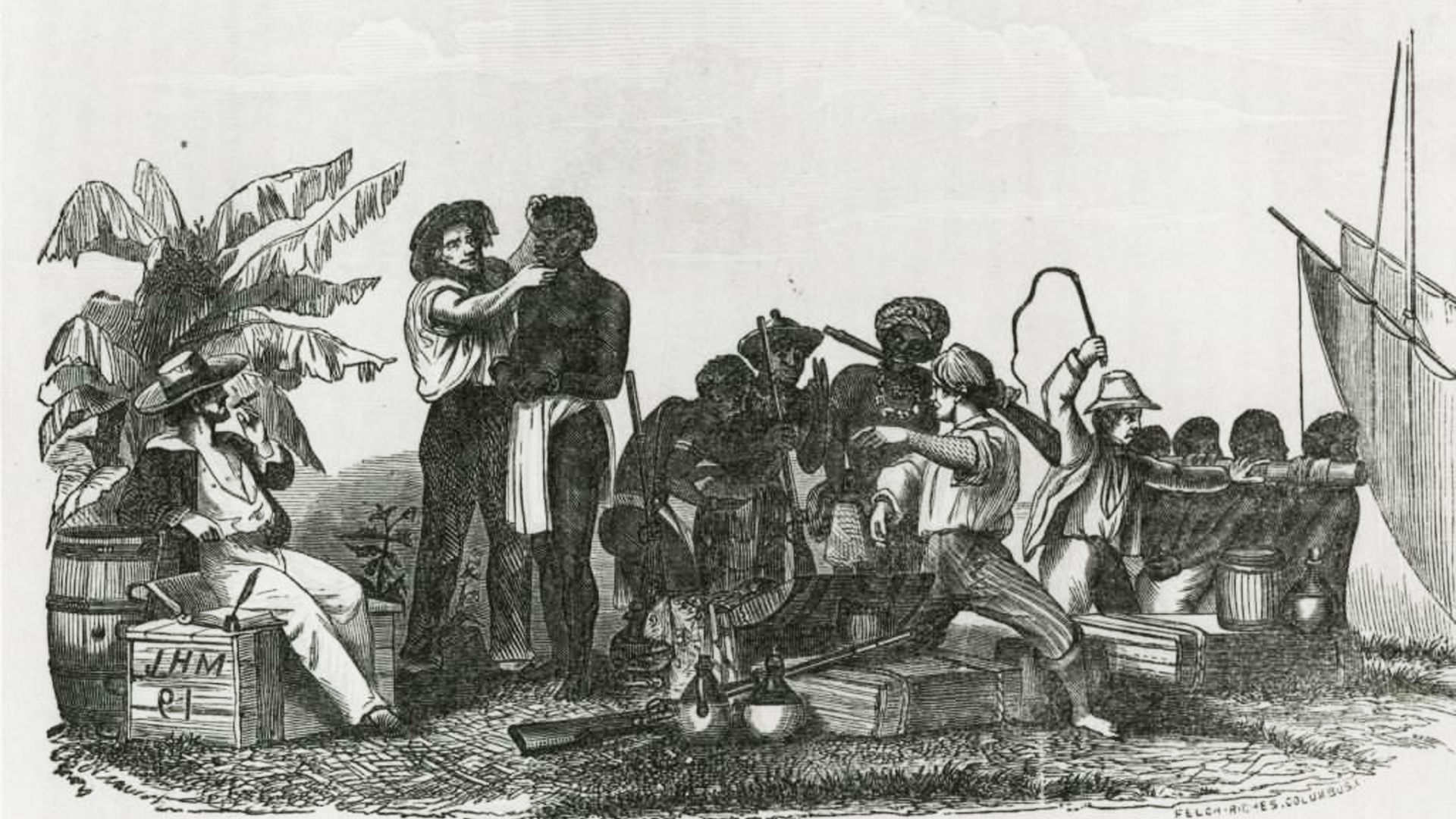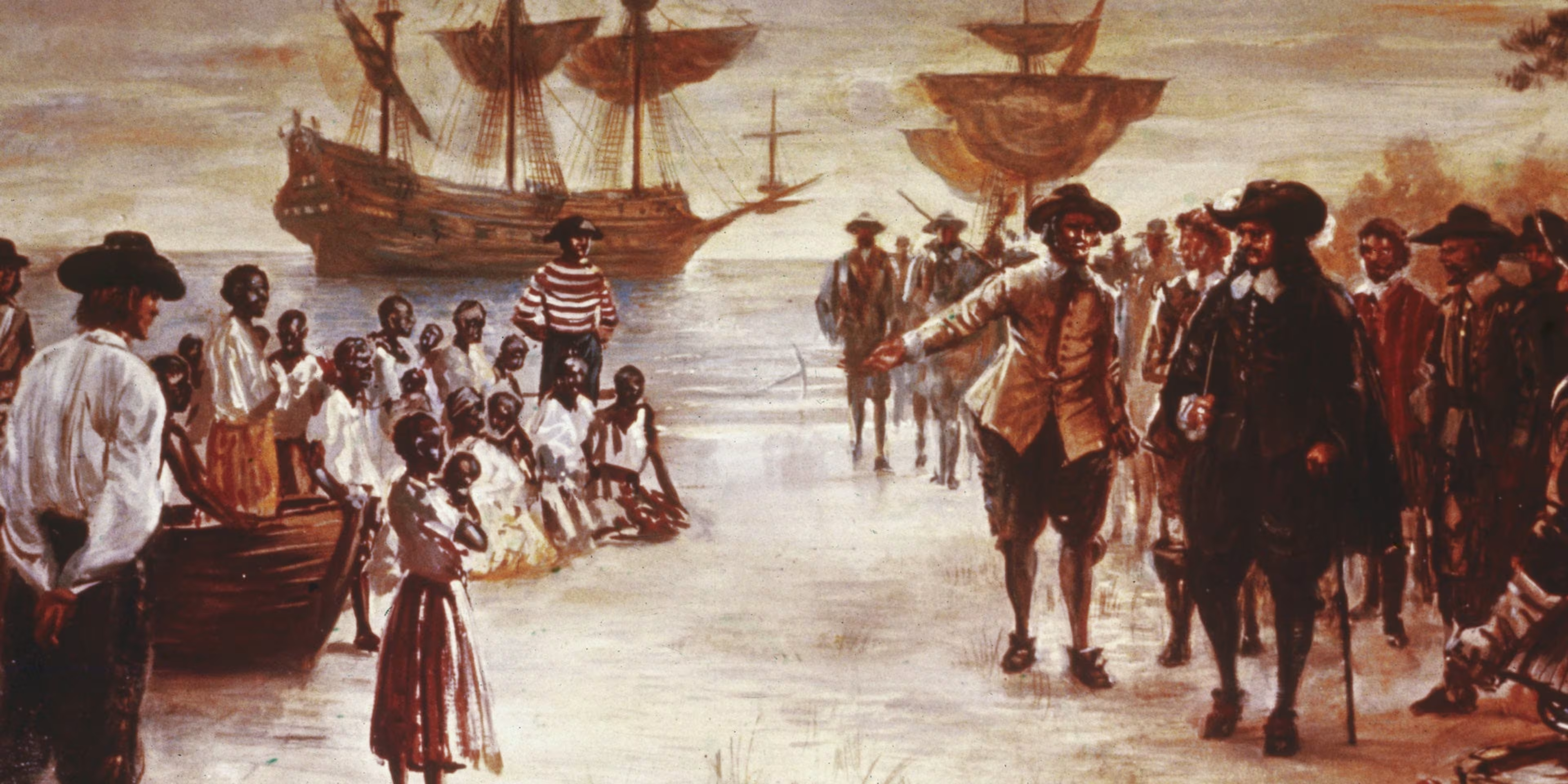First Enslaved Africans Arrive in Virginia

Illustration of enslaved Africans arriving at Point Comfort, Virginia in 1619
What Happened?
On or about August 20, 1619, ‘20 and odd’ Africans kidnapped from the kingdoms of Ndongo and Kongo in present-day Angola arrived in Virginia. Captured by Portuguese forces, they were forced to march to the port of Luanda, where they were loaded aboard the San Juan Bautista. Of the 350 captives on board, about 150 died during the brutal Middle Passage. The ship was intercepted near Veracruz by two English privateers, the White Lion and the Treasurer, which seized dozens of captives.
The White Lion brought some of the survivors to Point Comfort, Virginia, trading them for food with English colonists. While official records described them as ‘servants,’ the reality was forced bondage. Among them were Antonio and Isabella, who later had a son, William, the first recorded African child born in English America.
Virginia didn't yet have formal slavery laws in 1619, but within a few decades, racial slavery became codified. A 1640 court case sentenced John Punch, an African man, to lifetime slavery, marking the legal shift toward race-based servitude. By 1662, Virginia declared that children inherited the enslaved status of their mothers, entrenching slavery as a hereditary system.
The arrival of Africans in Virginia was part of the broader transatlantic slave trade, which uprooted more than 12.5 million Africans over three centuries. Though fewer enslaved Africans were brought to mainland North America than to the Caribbean or Brazil, their labor and suffering profoundly shaped American society, economy, and culture.
Slavery would become the backbone of the colonial economy, fueling the rise of tobacco and cotton plantations. By the time of the Civil War, nearly four million people were enslaved in the United States. Though legally abolished in 1865, the legacy of slavery continues to shape the nation, from systemic racism to economic inequality. The events of 1619 stand as a stark reminder of America’s foundations and its unfinished struggle for justice.
Why It Matters
The arrival of enslaved Africans in Virginia in 1619 is often called America’s ‘original sin.’ It marks the beginning of a system that exploited human lives for profit and laid the foundations of racial inequality that persist to this day. Understanding this moment isn't about assigning distant blame—it is about acknowledging how deeply slavery is woven into America’s story. To face the present honestly, we must remember the lives stolen, the families broken, and the systems built on their backs. Only then can we begin to imagine—and create—a future not defined by injustice, but by equity and dignity for all.
?
How did indentured servitude differ from slavery, and how did the system shift in Virginia?
Who were Antonio and Isabella, and why is their son William important in history?
How did the legal system in Virginia gradually codify slavery as a racial caste?
What long-term effects of slavery can still be seen in American society today?
Dig Deeper
On August 20, 1619, the first enslaved Africans arrived in Virginia at Point Comfort aboard the English ship White Lion. ‘20 and odd Negroes’ were exchanged for food and sold into bondage, beginning the story of slavery in North America.
Related

The Encomienda System: Empire, Labor, and the Roots of Colonial Slavery
The encomienda system promised 'protection' and Christianization. What it delivered was forced labor, cultural erasure, and the blueprint for slavery in the Americas.

Life and Society in the Colonial Carolinas
Explore the rise of plantation agriculture, slavery, class divisions, and the shaping of daily life in the colonial South—particularly in North Carolina and South Carolina.

The Market Revolution: How Innovation Transformed America
In the early 1800s, America changed from a land of small farms to a booming nation of factories, railroads, and markets. The Market Revolution connected people, goods, and ideas—while also revealing deep inequalities in who benefited from progress.
Further Reading
Stay curious!
